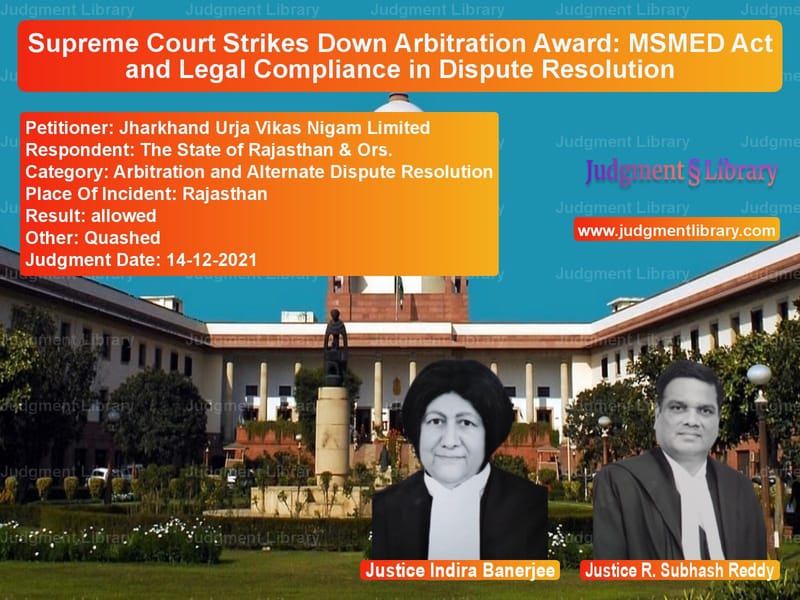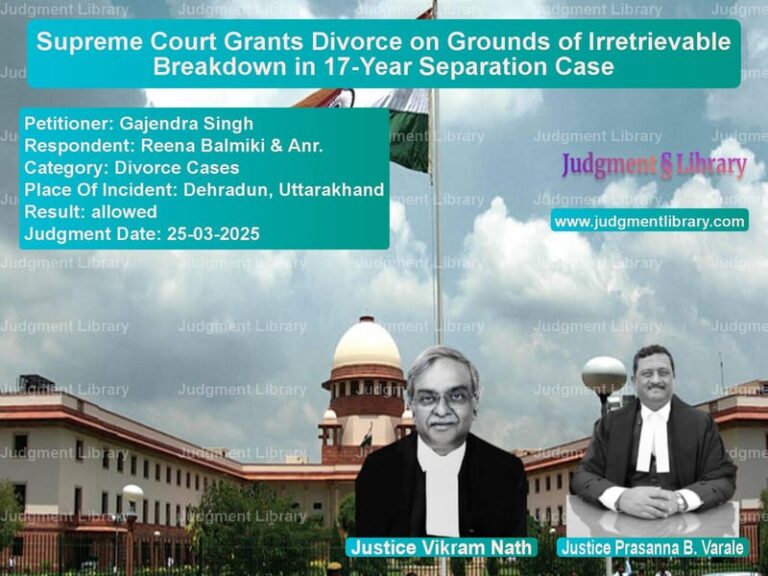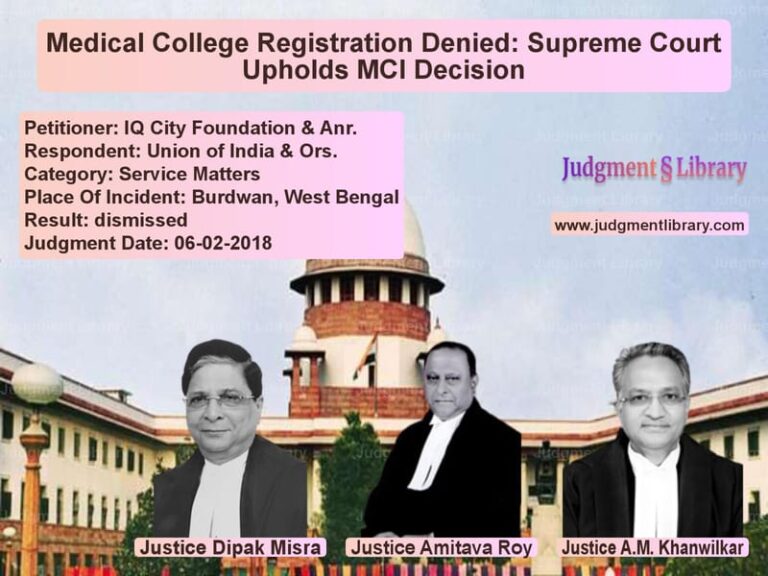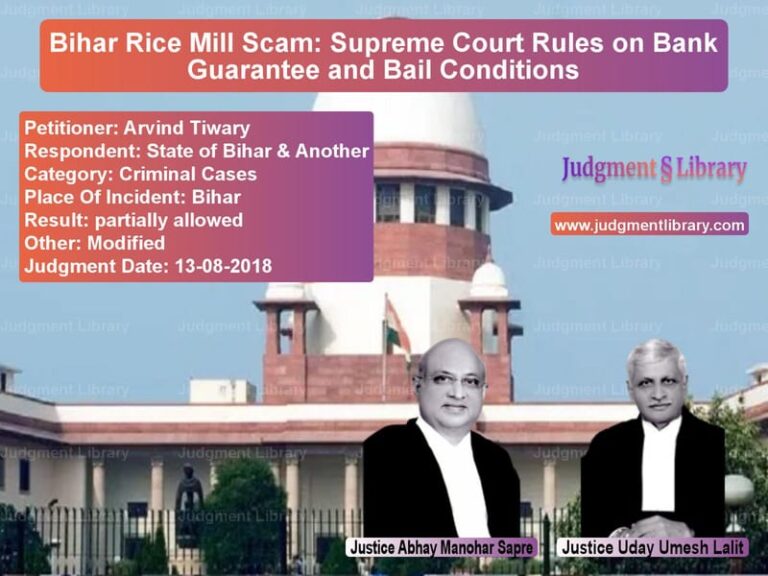Supreme Court Strikes Down Arbitration Award: MSMED Act and Legal Compliance in Dispute Resolution
The Supreme Court of India recently ruled in Jharkhand Urja Vikas Nigam Limited vs. The State of Rajasthan & Ors., addressing critical concerns regarding arbitration proceedings under the Micro, Small and Medium Enterprises Development Act, 2006 (MSMED Act). The ruling set aside an order passed by the Rajasthan Micro and Small Enterprises Facilitation Council (Council), which directed Jharkhand Urja Vikas Nigam Limited (JUVNL) to pay a substantial amount to M/s. Anamika Conductors Ltd. The apex court found that the Council had violated legal provisions by failing to conduct proper arbitration proceedings.
Background of the Case
Jharkhand Urja Vikas Nigam Limited, the appellant, is the successor company of the erstwhile Jharkhand State Electricity Board. The company had entered into a contract with M/s. Anamika Conductors Ltd. for the supply of ACSR Zebra Conductors. The supplier, claiming to be a small-scale industry, approached the Rajasthan Micro and Small Enterprises Facilitation Council, demanding payment of Rs. 74,74,041 as the principal amount and Rs. 91,59,705 as interest.
Despite multiple notices, the appellant did not appear before the Council. Consequently, on August 6, 2012, the Council passed an order directing JUVNL to pay the claimed amount within thirty days.
Key Legal Issues
- Whether the Council’s order was legally sustainable under the MSMED Act and Arbitration and Conciliation Act, 1996.
- Whether the Council followed due process in resolving the dispute.
- The validity of the Council’s decision to pass an order without conducting arbitration.
Petitioner’s Arguments
- The appellant argued that there were unresolved disputes regarding the quality of supplies made by M/s. Anamika Conductors Ltd., which delayed payment.
- The Council passed the order solely because the appellant failed to appear in conciliation proceedings, which is not legally permissible.
- As per Section 18(3) of the MSMED Act, arbitration must be conducted if conciliation fails. The Council neither conducted arbitration proceedings nor referred the case to an institution for dispute resolution.
- The order was passed without providing an opportunity for JUVNL to present its defense, making it a violation of natural justice.
- The order was a nullity since it did not comply with the mandatory provisions of the Arbitration and Conciliation Act, 1996.
- The contract specified that any dispute would fall under the jurisdiction of civil courts in Ranchi. However, M/s. Anamika Conductors Ltd. approached the Rajasthan Council, which lacked territorial jurisdiction.
Respondent’s Arguments
- The respondent, Rajasthan Micro and Small Enterprises Facilitation Council, argued that the order was passed due to JUVNL’s failure to appear despite repeated notices.
- The appellant had the option to challenge the award under Section 34 of the Arbitration and Conciliation Act, 1996, but failed to do so.
- M/s. Anamika Conductors Ltd. contended that the appellant delayed payments even after receiving supplies.
- It was asserted that JUVNL had already paid Rs. 63,43,488 after inspecting records, acknowledging its liability.
Supreme Court’s Ruling
The Supreme Court, in a bench comprising Justices Indira Banerjee and R. Subhash Reddy, ruled in favor of JUVNL, setting aside the impugned order. The Court observed:
“The order dated 06.08.2012 is a nullity and runs contrary not only to the provisions of MSMED Act but also to various mandatory provisions of the Arbitration and Conciliation Act, 1996.”
Key Observations by the Supreme Court
- The MSMED Act mandates conciliation before arbitration. The Council failed to initiate arbitration, which made its order legally untenable.
- The order was passed solely on JUVNL’s absence, without adjudicating the dispute or allowing proper representation.
- Section 18(3) of the MSMED Act clearly states that arbitration must be conducted when conciliation fails, and provisions of the Arbitration and Conciliation Act, 1996, must be followed.
- The Council overstepped its jurisdiction by not conducting arbitration and instead treating conciliation proceedings as final.
- While JUVNL did not challenge the order under Section 34 of the Arbitration and Conciliation Act, 1996, the Court held that it was not a valid award in the first place and thus, Section 34 did not apply.
The Court emphasized:
“An order passed without recourse to arbitration and in utter disregard to the provisions of the Arbitration and Conciliation Act, 1996, cannot be upheld.”
Final Verdict
The Supreme Court allowed the appeal and quashed the Council’s order. It also directed that:
- The dispute should either be taken up for arbitration by the Council or referred to an appropriate institution for alternate dispute resolution.
- Any future arbitration proceedings must strictly follow the Arbitration and Conciliation Act, 1996.
- The Court made it clear that it had not ruled on the merits of the financial claim, leaving it open for arbitration to decide.
Key Takeaways
- MSMED Act does not override arbitration principles: Facilitation Councils must adhere to both the MSMED Act and the Arbitration and Conciliation Act, 1996.
- Conciliation and arbitration are distinct processes: A dispute cannot be resolved merely on the basis of conciliation failure; arbitration must follow.
- Orders without arbitration are legally invalid: Facilitation Councils cannot bypass arbitration and issue binding payment orders.
- Natural justice must be upheld: A party must be given the opportunity to defend itself before an award is passed.
This judgment reinforces the importance of following due legal process in arbitration matters and upholds the rights of entities to contest decisions that violate procedural fairness.
Petitioner Name: Jharkhand Urja Vikas Nigam Limited.Respondent Name: The State of Rajasthan & Ors..Judgment By: Justice Indira Banerjee, Justice R. Subhash Reddy.Place Of Incident: Rajasthan.Judgment Date: 14-12-2021.
Don’t miss out on the full details! Download the complete judgment in PDF format below and gain valuable insights instantly!
Download Judgment: jharkhand-urja-vikas-vs-the-state-of-rajasth-supreme-court-of-india-judgment-dated-14-12-2021.pdf
Directly Download Judgment: Directly download this Judgment
See all petitions in Arbitration Act
See all petitions in Dispute Resolution Mechanisms
See all petitions in Enforcement of Awards
See all petitions in Institutional Arbitration
See all petitions in Judgment by Indira Banerjee
See all petitions in Judgment by R. Subhash Reddy
See all petitions in allowed
See all petitions in Quashed
See all petitions in supreme court of India judgments December 2021
See all petitions in 2021 judgments
See all posts in Arbitration and Alternate Dispute Resolution Category
See all allowed petitions in Arbitration and Alternate Dispute Resolution Category
See all Dismissed petitions in Arbitration and Alternate Dispute Resolution Category
See all partially allowed petitions in Arbitration and Alternate Dispute Resolution Category







